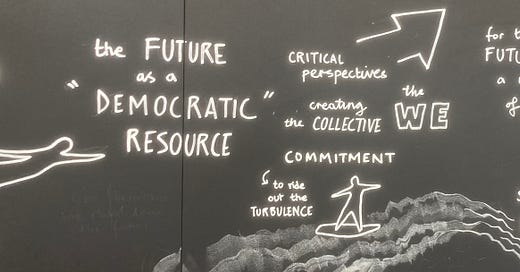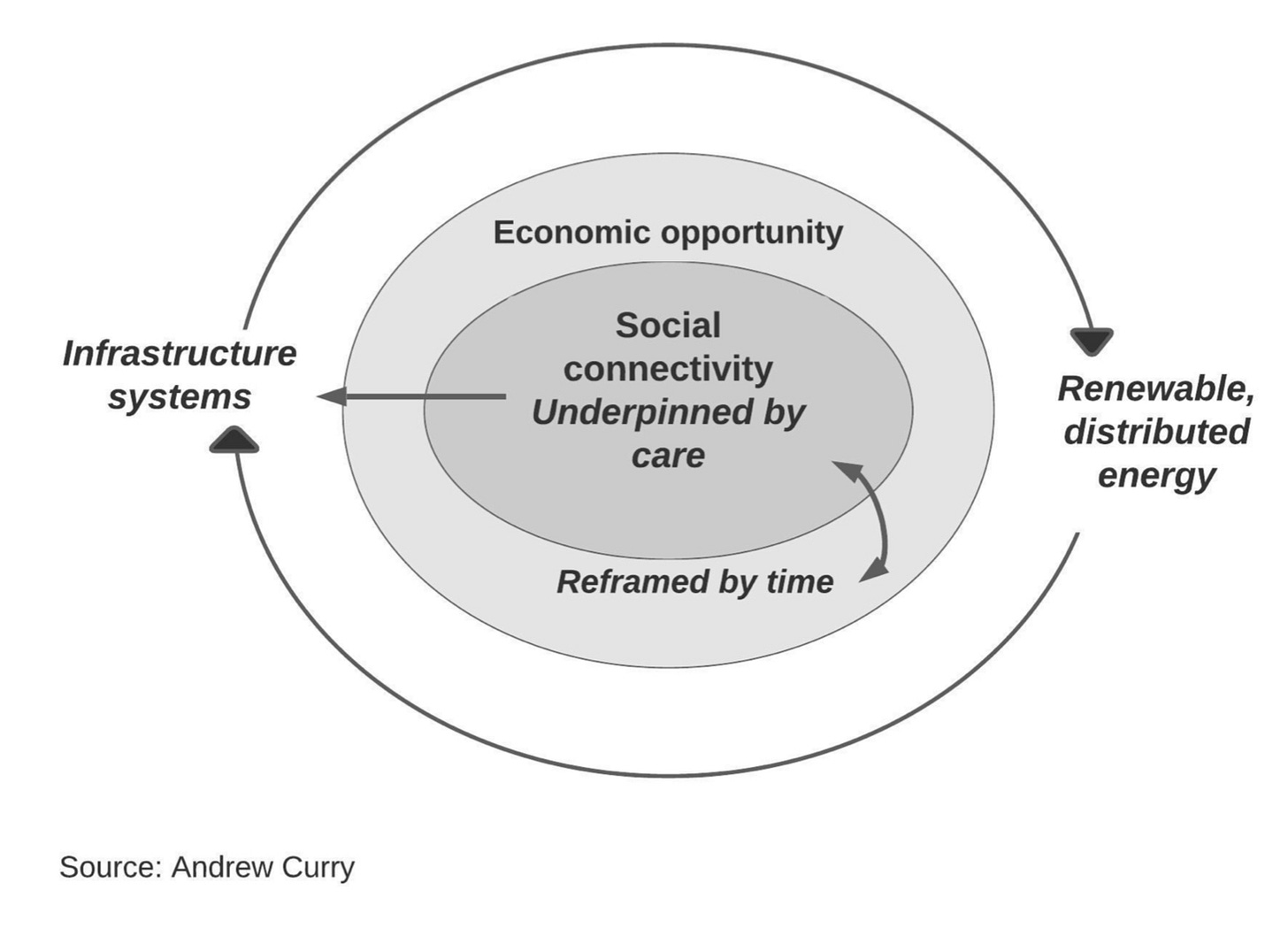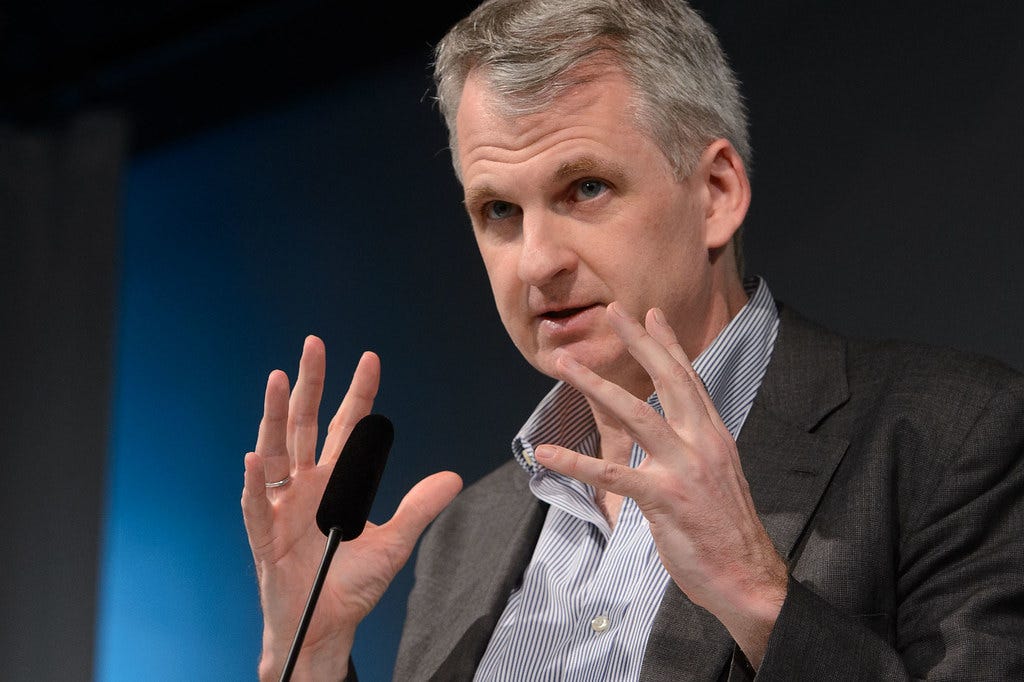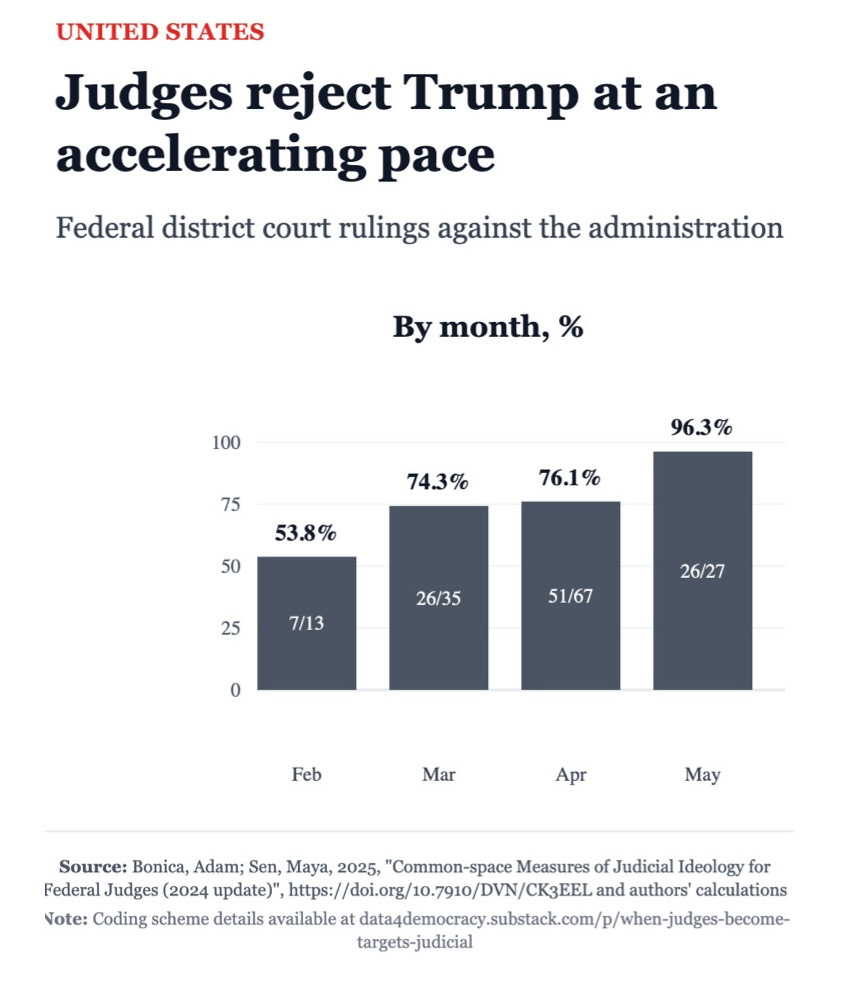27 May 2025. Politics | Authoritarianism
Why we need a politics of the future // Authoritarianism and the rise of the new paganism. [J2T #640]
Welcome to Just Two Things, which I try to publish a couple of times a week. Some links may also appear on my blog from time to time. Links to the main articles are in cross-heads as well as the story. A reminder that if you don’t see Just Two Things in your inbox, it might have been routed to your spam filter. Comments are open.
1: Why we need a politics of the future
I was asked to talk about resilience at an event last week organised by the architects Perkins & Will, and decided to speak to the idea of “a politics of the future”, which seems increasingly important if we’re going to navigate a world of climate disruption and psychic loss—quite apart from the practicalities of de-carbonising our societies. This is a slightly expanded version of my remarks there.
An event illustrator, Temujen Gunawardena, was on hand to create an image of the meeting, and this is her version of my part of the talk.
(A politics of the future. Illustration: www.temjam.com. With thanks to Perkins & Will).
I drew quite heavily on a paper from last year by Julian White, at the LSE, called ‘The Future as a Democratic Resource’. He asks, rhetorically,
What gets lost when the future gets lost?
The answer, rather starkly, is democratic politics. The reason for this is that elections within a democracy are supposed to be a competition between different parties offering differing imagined futures. (This is similar to Jens Beckert’s argument in Imagined Futures that within businesses senior managers compete on visions of the future of the organisation.)
But there’s a big hole where these imagined futures ought to be. The right tends to offer a vision of an imagined past, while centre parties, whether centre-left or centre-right, are intent on managing the present. They are focused on policy, not politics. I’ll come back to this distinction.
The research suggests that this lack of alternatives affects voting level because people start abstaining from voting, and that the more disadvantaged are the first to drop out.
And maybe there are a couple of findings from the polling research that are relevant here.
The first is that people are likely to believe that other people are less concerned about climate change than they are, which reduces public pressure for political action. You have to wonder if the technocratic way that climate change and related policies are discussed in public influences this perception.
At the other end of the political spectrum, people who voted for Trump in 2016 and Brexit in 2017 are more likely to answer ‘no’ to a question about whether their children will have a better life than they did. They believe that the future is closing down on them.
White argues in his paper that there are three benefits of a politics of the future. These are:
Critical perspective
Collective agency, and
Commitment.
Expanding on these a little, critical perspective creates a distance between the present and a possible future, making it easier to imagine a different future. Meaningful alternatives also allow for a direction of travel, rather than simply reacting to events.
Creating the collective—or perhaps creating a collective—is about building a shared idea of “we”. This is something politics, broadly described, can do, but policy can’t do. Party politics will still be a form of coalition building in the conventional sense of creating collections of interests around issues. But the element of the future imagination creates more coherence.
White quotes Roberto Unger as saying
Politicians need to speak in two languages - both calculations of interest and political prophecy.
The third element here, commitment, is about giving this coalition some coherence when things get turbulent. Because, if you’re going to change anything, you’re also going to end up in the “transition trough”: things will get harder and bumpier before they get better. A politics of the future allows you to ride those rapids.
So maybe there’s also a fourth ‘c’ here, for cohesion.
Some of this brings to mind the recent book Abundance, by Ezra Klein and Derek Thompson. I’ve not read it, but it’s been impossible to miss it. It’s been #1 on the New York Times best-seller list, and almost every male policy-wonk in America has felt the need to write something about it.
One of those posts quoted two sentences from the introduction which they felt summarised the thesis of the book:
“This book is dedicated to a simple idea: to have the future we want, we have to build and invent more of what we need. That’s it. That’s the thesis.”
Building and inventing, broadly speaking, more houses, more (high speed) rail, more green-tech and more clean tech. It’s worth noting that the we in that quote is doing a lot of work, and for my money, this is fairly thin stuff. In effect, it’s a call for more public goods. (Nothing with that: we generally need more public goods, but we need quite a lot more than that.)
The reason Abundance is interesting to me is not because of what it is, but because what all that interest in it represents.
(Raymond Williams: structures of feeling. Photo: Gwydion Madawc Williams, public domain.)
The cultural critic Raymond Williams developed the idea of structures of feeling—which I should come back to here on another occasion—to describe changes that you could sense or feel before you could measure them.
Sometimes these appear in culture first: for example Williams describes how changing attitudes to debt in England in the 19th century were seen first in the writings of Dickens and Emily Bronte. In other words, structures of feeling signal a possible cultural hypothesis.
It’s also worth noting that Abundance is one of a set of US books that are about the same issue: Stuck, by Yoni Appelbaum, and Why Nothing Works, by Marc Dunkelman, are in the same policy space.
As it happens, some of the hypothesis of Abundance has been tested. The Biden administration spent $1 trillion investing in public goods under the Inflation Reduction Act, and as far as we can tell, given how things turned out, nobody noticed.
And the purpose here is not to spend time on a critique of Abundance, but just to note that it is a book about policy, not politics. And Ezra Klein has said as much on his podcast, when he talked to critics of his book on the American left. (He also admitted to being surprised by these criticisms, which were about the lack of politics, and political economy, in the book.) From my notes:
We should start from the policy outcomes we want and work backwards.
Because: a politics of the future needs to involve more than building. Some of this reminds me of the work of another cultural critic, the late Mark Fisher, who wrote across two different books about the cultural and political impact of neoliberalism.
In his collection Ghosts of my Life, he writes about “the slow cancellation of the future”, drawing on the work of Franco Berardi. The way I summarised this on my blog was that
the combination of the neoliberal ethos that has dominated since the 1980s and the emergence of ubiquitous ICT had closed down our ideas of the future
In the lead essay in the book, Fisher looked in particular at the cultural sense of stasis:
While 20th Century experimental culture was seized by a recombinatorial delirium, which made it feel as if newness was infinitely available, the 21st Century is oppressed by a crushing sense of finitude and exhaustion. It doesn’t feel like the future.
In his earlier book, Capitalist Realism, Fisher wrote about the crisis of “the three reals” of capitalism: the ecological crisis, widespread mental distress, and proliferating bureaucracy. (Dan Davies has returned to the last of these more recently in his book The Unaccountability Machine.)
The politics of a book like Abundance seems to try to address the first of these, but not in a way that is completely convincing—there’s a lot of building involved, and that is going to involve materials, etc. But it doesn’t start to address the psychological crisis or the sense of an outsourced bureaucracy that seems designed to ensure that we have no control over our lives.
I’ve written about this in a chapter that’s now due to come out sometime this year. The underlying argument of that chapter is that the current extractive economic model of the city has reached its limits. It is no longer able to reproduce itself, economically, socially, or culturally. This crisis of reproduction is one of the reasons why we have no politics of the future.
(Source: Andrew Curry)
In all of this, the ecological city is a hygiene factor. A meaningful politics of the future will need to deal with the psychological crisis. So it might also involve a different politics of time—and we’re already seeing this in the innovations around the four day week. And it will need a different politics of care, and we’re not close to that yet. My suggestion here is that a politics of the future that might make a difference would be about reimagining our relationships, with each other and with nature.
2: Authoritarianism and the rise of a new paganism
Timothy Snyder’s lecture on The New Paganism, given at the New York Public Library in April, is one of the most interesting sets of ideas about the rise of authoritarianism that I have heard. Oddly, there’s not a transcript online, and I’ve seen hardly any commentary either, although there is a summary at The Common Reader.
Snyder is an historian of the 20th century, although right now he’s perhaps best known as the author of On Tyranny, and the talk was given as the New York Review of Books Robert B. Silvers lecture, in memory of the great NYRB editor, and Snyder insisted several times that his argument was “too weird” to be published in the magazine.
(Timothy Snyder. Photo: Heinrich Boll Stiftung, CC BY-SA 2.0)
So let me try to unpack his argument a little here, while also recommending listening to the whole talk, which runs for about 55 minutes.
We are, he suggests, in a “third nature”, in which authoritarians are channelling a whole range of ideas and symbols associated with the pre-Christian world, and often with Viking culture. This is at the level of underlying interpretation and meaning, although there are also visible signs.
As The Common Reader paraphrased,
First nature might be illustrated, he said, by imagining you were an eighth-century Scandinavian who had an unpredictable interaction with nature through early agriculture, hunting, and raiding…
Second nature was modernity, recorded history, culture. This was our reality until recently, and in it we had more control of nature... The use of hydrocarbons, “the source of power of the industrial revolution,” “gives [that] sense of control.”
”The third nature is the period that we have now,” he said. It “brings together the exhaustion of the second nature and a kind of revival of the first in a more tedious, uninteresting way….”
But underlying that third nature is also an underlying realisation, in a return of the repressed kind of a way, that nature is now controlling us.
That’s really just the set-up, because the meat of the argument is about the sources of meaning in ‘first nature’, and how they are being refracted in ‘third nature’, a world that is characterised by the ecological crisis and the limits of hydrocarbons.
He tells this story around five headings: Language; the Oracle; Sacrifice, Charisma, and Value.
The argument about language is probably the least interesting, but basically he suggests that our language in a world dominated by forms of social and digital media is returning to some of the forms of the pre-literate world. We are more reluctant to read at all, and although he doesn’t say it he implies that you could probably explain the idea of a meme to someone in the Norse world who was used to runes.
The Oracle, of course, was a form of a divination where, as the supplicant, you were told something ambiguous and acted on your understanding of it. He talks about one particular form of horse divination that was common across northern Europe, where a horse was maintained for oracular purposes, and never ridden.
This leads to an elegant connection: much of the behaviours that are encoded into the forms of manipulation that are used by tech companies to maintain our addiction to digital content was first tested on animals and birds in the first part of the 20th century.
Snyder suggests that calling a smartphone a “phone” is misleading: in fact it is more like an Oracle.
He also suggests that the rise of the smartphone has changed the way that we consider technology, but not in the way that this is usually discussed. The word “technology” historically was about something that extended our capabilities (shades of its origins in the Greek word techne, I thought), but it’s now become an all-purpose word that just means “gadgets”. Our use of all this digital media also makes it harder for us to shake off our addiction to hydrocarbons.
Which makes for another connection: the war in Ukraine, launched by the world’s biggest hydrocarbon oligarch as part of an assault on the notion that as a species we need to wean ourselves off hydrocarbons. And his biggest most devoted supporter is the world’s most successful digital oligarch, Elon Musk.
Sacrifice, including both animal and human sacrifice, was a significant feature of the first nature, and one of the noticeable elements of the transition to the second nature is that human sacrifice is no longer acceptable.
But Snyder points out that the language of sacrifice was embedded in the rhetoric that Russia has used to justify the invasion of Ukraine—and to justify the huge Russian bodycount. And he suggests that the current operations of ICE, in snatching people off the streets rather than just sending them a letter revoking their visas, was also a form of theatricality designed to evoke sacrifice, in the same way that slaves were sacrificed in the first nature. (This analogy maybe doesn’t stretch that far: a slave girl sacrificed at the death of a chieftain believed that in death she was marrying the chief for the afterlife).
The fourth element here is Charisma, in the Weberian sense of charismatic authority—the kind of leadership of the chieftain in pre-modern states. It took a while, but eventually in the second nature we got to a point where rules were systematised and encoded into law. This is Weber’s ‘Iron Cage’, which was a necessary step to enable the formation of democratic states.1
Charismatic authority is in direct opposition to the bureaucratic authority of the modern state, which curtails the ability of the leader to do as they please. And so, with authoritarians everywhere, and most recently with Donald Trump, we see arbitrary attacks on forms of bureaucratic authority, and notably on the law.
(In passing, I saw a striking chart on the clash between Trump’s torrent of executive orders and the courts. There’s only a modest difference between Republican-appointed and Democrat-appointed judges).
(Via Memex 1.1)
The last category is about Value, and here Snyder’s contrast here is that the Vikings tended not to use their wealth but to bury it. This was part of their metaphysics: wealth stored underground, under Odin’s Law, could be taken with you when you died.
Similarly, perhaps, the value now accumulated by billionaires has no meaning anymore as use value or exchange value (although perhaps, as Elon Musk and Peter Thiel have demonstrated in different ways, it can be exchanged for forms of political influence.) But they can’t give it away, preferring to hoard it. One difference here is that in first nature, the way to be immortal was to do things that lived on for ever, whereas our billionaires hope that immortality is purely to do with biology:
This notion of immortality valorises not courage, but cowardice. Because if you believe that you could physically live for ever, then every day is a source of threat.
Snyder has a striking passage in the talk where he observes that Trump’s charisma (even if this doesn’t extend beyond the United States) has allowed him to construct himself as “a god of wealth”.
Like other gods of wealth, Trump is only wealthy because you give things to him... The gods of wealth has horses and goats and cattle because you sacrificed them. Trump never really has any money... but he presented as a god of wealth, and it was the presentation as a god of wealth that allowed him to be wealthy... That’s a very special sort of charisma.
All models are wrong, but some are useful. Their utility lies in their explanatory power: as you strip detail away from complexity, does what is left help you to understand the world better? There’s more nuance in this argument than I have space for here, but in this case I’d say that it does.
And as he pointed out—to loud applause, but then, it was a New York Public Library crowd—the whole lecture, which draws largely on the work of archaeologists, anthropologists, and historians, is also an argument in defence of the humanities.
j2t#640
If you are enjoying Just Two Things, please do send it on to a friend or colleague.
This reminds me that one of the reasons that Napoleon is still held in high regard across parts of Europe is that his troops brought with them the Code Napoleon, which swept away forms of feudal authority and replaced them with written law.








Great, as ever. One thing I disagree with, though. I think that Abundance and similar are also addressing the crisis of proliferating bureaucracy.
Certainly, those I know who have read it link the critique with over-regulation in planning, and DEI training (which has good intentions but is so ineffective that it is a waste of time).
Thanks for both deeper dives. While all of it may not have fully resonated, it definitely added to my own perspective-building.
I've long said that you will feel the future before you can articulate it, endorsing a kind of somatic sensing beyond our thin safety net of accessible metrics. But I was unfamiliar with "structures of feeling", which seems highly relevant albeit more collective.
As for our authoritarian times, George Box is highly apt here. But Timothy Snyder provides a useful alternate lens to the René Girard one I most commonly encounter.